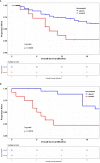Dissecting Outcomes: Should Cytoreductive Nephrectomy Be Performed for Patients With Metastatic Renal Cell Carcinoma With Sarcomatoid Dedifferentiation?
- PMID: 33643921
- PMCID: PMC7902859
- DOI: 10.3389/fonc.2020.627025
Dissecting Outcomes: Should Cytoreductive Nephrectomy Be Performed for Patients With Metastatic Renal Cell Carcinoma With Sarcomatoid Dedifferentiation?
Abstract
Background: It is highly contested whether cytoreductive nephrectomy for treating advanced renal cell carcinoma (RCC) with sarcomatoid features (sRCC) benefits overall survival. Patients with sRCC are known to have a poor prognosis, and these tumors have a more aggressive biology than those without sarcomatoid features.
Methods: Patients with clear cell RCC or non-clear cell RCC underwent cytoreductive nephrectomy in efforts to improve overall survival (OS). Patients were stratified by presence or absence of histologic sarcomatoid features within tumor samples.
Results: Of 167 patients who underwent cytoreductive nephrectomy, 127 had clear cell RCC, of whom 14 had sarcomatoid features, and 40 had non-clear cell RCC, of whom 13 had sarcomatoid features. Median age of the cohort was 62 years (range, 56.5-69 years). The cohort included 119 male (71.3%) and 48 (28.7%) female patients. Among all patients with advanced RCC, having sRCC had a significantly worse OS after cytoreductive nephrectomy (30 vs 8 months; hazard ratio [HR], 2.88; P <0.0001). Additionally, favorable-risk patients had significantly longer OS compared to intermediate- or poor-risk patients (56 vs 30 vs 10 months; HR, 0.21; P =0.00016). For patients with clear cell RCC, having sRCC conferred a significantly poorer survival (30 vs 9 months; HR, 2.82; P=0.0035). Patients with non-clear cell sRCC also had significantly worse outcomes compared to patients whose tumors did not have sarcomatoid features (30 vs 6.5 months; HR, 3; P =0.009). When patients with sRCC were stratified by whether there was >10% or ≤10% sarcomatoid features present within the sample, there was no significant difference in OS (8 vs 8.5 months; P =0.32).
Conclusions: Sarcomatoid features within tumor histology confer significantly poor prognosis. Patients with sRCC, regardless of clear cell vs non-clear cell histology, have significantly shorter OS. Even among patients with 10% or less sarcomatoid features, there was no OS benefit to cytoreductive nephrectomy. Based on our findings, there appears to be a limited to no role of cytoreductive nephrectomy if sRCC is identified on pretreatment biopsy. The role of radiomics and pre-operative biopsies may confer significant benefit in this patient population.
Keywords: cytoreductive nephrectomy; kidney cancer; renal cell cancer; sarcomatoid dedifferentiation; systemic therapy.
Copyright © 2021 Adashek, Zhang, Skelton, Bilotta, Chahoud, Zemp, Li, Dhillon, Manley and Spiess.
Conflict of interest statement
The authors declare that the research was conducted in the absence of any commercial or financial relationships that could be construed as a potential conflict of interest.
Figures



Similar articles
-
The Role of Cytoreductive Nephrectomy in Renal Cell Carcinoma with Sarcomatoid Histology: A Case Series and Review of the Literature.Curr Oncol. 2022 Aug 3;29(8):5475-5488. doi: 10.3390/curroncol29080433. Curr Oncol. 2022. PMID: 36005171 Free PMC article. Review.
-
The Role of Cytoreductive Nephrectomy for Sarcomatoid Renal Cell Carcinoma: A 29-Year Institutional Experience.Urology. 2020 Feb;136:169-175. doi: 10.1016/j.urology.2019.08.058. Epub 2019 Nov 11. Urology. 2020. PMID: 31726184 Free PMC article.
-
Localised non-metastatic sarcomatoid renal cell carcinoma: a 31-year externally verified study.BJU Int. 2024 Feb;133(2):169-178. doi: 10.1111/bju.16125. Epub 2023 Sep 9. BJU Int. 2024. PMID: 37589200 Free PMC article.
-
Trends and Outcomes in Sarcomatoid Renal Cell Carcinoma: Analysis of the National Cancer Data Base.Eur Urol Open Sci. 2024 Dec 13;71:96-105. doi: 10.1016/j.euros.2024.10.002. eCollection 2025 Jan. Eur Urol Open Sci. 2024. PMID: 39758852 Free PMC article.
-
Outcomes Associated with First-Line anti-PD-1/ PD-L1 agents vs. Sunitinib in Patients with Sarcomatoid Renal Cell Carcinoma: A Systematic Review and Meta-Analysis.Cancers (Basel). 2020 Feb 10;12(2):408. doi: 10.3390/cancers12020408. Cancers (Basel). 2020. PMID: 32050629 Free PMC article. Review.
Cited by
-
Establishment and validation of a nomogram to select patients with metastatic sarcomatoid renal cell carcinoma suitable for cytoreductive radical nephrectomy.Front Oncol. 2023 Oct 23;13:1239405. doi: 10.3389/fonc.2023.1239405. eCollection 2023. Front Oncol. 2023. PMID: 37941564 Free PMC article.
-
The Role of Cytoreductive Nephrectomy in Renal Cell Carcinoma with Sarcomatoid Histology: A Case Series and Review of the Literature.Curr Oncol. 2022 Aug 3;29(8):5475-5488. doi: 10.3390/curroncol29080433. Curr Oncol. 2022. PMID: 36005171 Free PMC article. Review.
-
Cytoreductive nephrectomy in metastatic renal cell carcinoma.Cochrane Database Syst Rev. 2024 Jun 7;6(6):CD013773. doi: 10.1002/14651858.CD013773.pub2. Cochrane Database Syst Rev. 2024. PMID: 38847285 Free PMC article.
-
The Evolving Landscape of Cytoreductive Nephrectomy in Metastatic Renal Cell Carcinoma.Cancers (Basel). 2023 Jul 29;15(15):3855. doi: 10.3390/cancers15153855. Cancers (Basel). 2023. PMID: 37568671 Free PMC article. Review.
-
The Role of Cytoreductive Nephrectomy and Targeted Therapy on Outcomes of Patients With Metastatic Sarcomatoid Renal Cell Carcinoma: A Population-Based Analysis.Cureus. 2022 May 27;14(5):e25395. doi: 10.7759/cureus.25395. eCollection 2022 May. Cureus. 2022. PMID: 35774668 Free PMC article.
References
-
- SEER stat fact sheets: kidney and renal pelvis cancer. seer.cancer.gov: NCI Division of Cancer Control and Population Sciences, updated 6/12/18; cited 2018 6/12/18. Available at: https://seer.cancer.gov/statfacts/html/kidrp.html
LinkOut - more resources
Full Text Sources
Other Literature Sources

